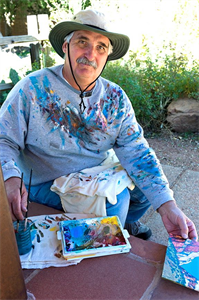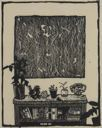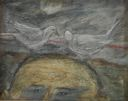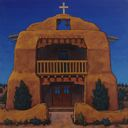William Royden Card
(Cardston, Alberta, Canada, 1952 - )
William Royden Card was born in Cardston, Canada, August 2, 1952. He is a talented artist in both acrylic painting and printmaking. His works reflect personal relationships-with close friends, as in Jenni's Bookshelf, and with the Utah landscape as well. As a child, Card always had an inclination toward the arts. By the time he was about nine, he knew he wanted to be an artist and began to draw a lot. He had a junior-high school teacher who encouraged him and even helped Card and his friends put together an art show in the school's lunchroom. His father, who was interested in painting as well, encouraged Royden and tried to facilitate his desire to paint. At the age of 13 or so, the father and son went to the art supply store to buy all the necessary tools real artists need. Royden is grateful for his father's sincere encouragement. In high school, Card was already a serious and experimental artist. He took an oil painting class all four years and served on the school newspaper staff. He drew ads and political cartoons of the school's staff, which often got him in trouble. While he was still in high school, Card created his first prints-linoleum cuts and silk screens. Having moved to Utah, Card experienced many opportunities to learn from local artists. His father was friends with Roman Andrus and Card was excited to be encouraged by a 'real artist.' Often times, he would ride his bike down to the Brigham Young University campus and visit the Harris Fine Arts Center, where he would poke his nose into some of the art classes to learn what he could from the professors and students. He particularly enjoyed bothering William Whitaker, and although he admired the artist, Royden often was asked to leave. Card attended Brigham Young University and came to admire other artists as well, such as Dennis Smith and Trevor Southey. Although he graduated with a Bachelor of Fine Arts in painting in 1976, he had already begun to explore a new interest in woodcuts. Jenni Christensen, a fine printmaker and a good friend in the art department, had introduced the technique to Card. Together, they had art parties where they ate and drew with other friends. Card describes Jenni as a person who has always had an interesting and beautiful home. Card found the subjects for his early still lifes there in her home. He did not prearrange items but found images that represented a human quality. Jenni's Bookshelf (1984), shows the texture and the light-to-dark contrasts typical of woodcuts, which fascinate Card. However, Card did not get a lot of experience with printmaking until he took advanced design classes. In 1979, he received his Master of Fine Arts in printmaking from BYU. Royden Card's woodcuts are small glimpses of Utah desert scenes, the texture and quality of the woodcuts echoing the carved landscapes of his subject matter. The prints have an intimate quality, clearly conveying his feeling for the land. Card has been a part-time faculty member in printmaking at BYU for the past 16 years. Ironically, his emphasis in his own works has recently shifted to the area of acrylics. He still depicts landscapes of the Utah desert, but has also been painting New Mexican adobe architecture. His architectural portrayals depict portions of a building, a single wall or other element, so the focus is on line, shape, and value contrast. He was recently one of nine finalists for the State of Utah Art Fellowship. Royden Card has six children, most of whom live in Seattle. They have learned to appreciate the arts and make them a part of their lives because of their father's example. Card admits that he has not influenced them to choose a profession in the arts simply because it is a difficult living. He also admits that it is his stubborn nature that has kept him from becoming anything other than an artist. His work ably demonstrates how his dedication to his talent makes him an effective artist.
(Cardston, Alberta, Canada, 1952 - )
William Royden Card was born in Cardston, Canada, August 2, 1952. He is a talented artist in both acrylic painting and printmaking. His works reflect personal relationships-with close friends, as in Jenni's Bookshelf, and with the Utah landscape as well. As a child, Card always had an inclination toward the arts. By the time he was about nine, he knew he wanted to be an artist and began to draw a lot. He had a junior-high school teacher who encouraged him and even helped Card and his friends put together an art show in the school's lunchroom. His father, who was interested in painting as well, encouraged Royden and tried to facilitate his desire to paint. At the age of 13 or so, the father and son went to the art supply store to buy all the necessary tools real artists need. Royden is grateful for his father's sincere encouragement. In high school, Card was already a serious and experimental artist. He took an oil painting class all four years and served on the school newspaper staff. He drew ads and political cartoons of the school's staff, which often got him in trouble. While he was still in high school, Card created his first prints-linoleum cuts and silk screens. Having moved to Utah, Card experienced many opportunities to learn from local artists. His father was friends with Roman Andrus and Card was excited to be encouraged by a 'real artist.' Often times, he would ride his bike down to the Brigham Young University campus and visit the Harris Fine Arts Center, where he would poke his nose into some of the art classes to learn what he could from the professors and students. He particularly enjoyed bothering William Whitaker, and although he admired the artist, Royden often was asked to leave. Card attended Brigham Young University and came to admire other artists as well, such as Dennis Smith and Trevor Southey. Although he graduated with a Bachelor of Fine Arts in painting in 1976, he had already begun to explore a new interest in woodcuts. Jenni Christensen, a fine printmaker and a good friend in the art department, had introduced the technique to Card. Together, they had art parties where they ate and drew with other friends. Card describes Jenni as a person who has always had an interesting and beautiful home. Card found the subjects for his early still lifes there in her home. He did not prearrange items but found images that represented a human quality. Jenni's Bookshelf (1984), shows the texture and the light-to-dark contrasts typical of woodcuts, which fascinate Card. However, Card did not get a lot of experience with printmaking until he took advanced design classes. In 1979, he received his Master of Fine Arts in printmaking from BYU. Royden Card's woodcuts are small glimpses of Utah desert scenes, the texture and quality of the woodcuts echoing the carved landscapes of his subject matter. The prints have an intimate quality, clearly conveying his feeling for the land. Card has been a part-time faculty member in printmaking at BYU for the past 16 years. Ironically, his emphasis in his own works has recently shifted to the area of acrylics. He still depicts landscapes of the Utah desert, but has also been painting New Mexican adobe architecture. His architectural portrayals depict portions of a building, a single wall or other element, so the focus is on line, shape, and value contrast. He was recently one of nine finalists for the State of Utah Art Fellowship. Royden Card has six children, most of whom live in Seattle. They have learned to appreciate the arts and make them a part of their lives because of their father's example. Card admits that he has not influenced them to choose a profession in the arts simply because it is a difficult living. He also admits that it is his stubborn nature that has kept him from becoming anything other than an artist. His work ably demonstrates how his dedication to his talent makes him an effective artist.





